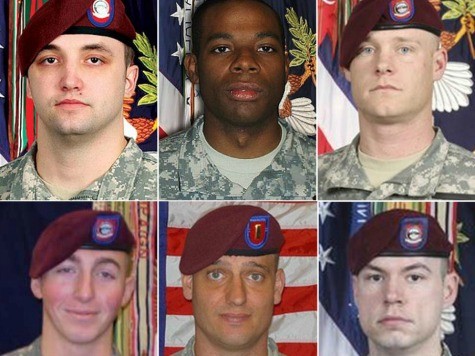
The controversy surrounding President Obama’s efforts to free Sergeant Bowe Bergdahl has rattled the country, as fellow soldiers insist Bergdahl deserted and their lives were put on the line to find him. Those who have not spoken– who cannot speak– are the six soldiers who ultimately gave their lives in the search for Bergdahl.
The six men who died–Staff Sergeant Clayton Bowen, Staff Sgt. Kurt Curtiss, 2nd Lt. Darryn Andrews, Pfc. Morris Walker, Staff Sergeant Michael Murphrey, and Pfc. Matthew Michael Martinek–were part of the same command unit as Bergdahl and died on missions related to his search.
Bowen and Walker were killed on the same mission by a roadside bomb in 2009 while out searching for Bergdahl. Curtis was killed in the same part of the country, Paktika Province, Afghanistan, by gunshot wound during an attack in which he was supporting Afghan security forces. Andrews and Martinek also died in Paktika, the victims of separate improvised explosive device attacks on their vehicles. Martinek lived for a week after the attack before finally yielding to his wounds. Murphrey also died after being wounded by an explosive.
The parents of some of these lost soldiers have begun to demand explanations. The Andrews family told the Daily Mail that the government told them Darryn died “while hunting a Taliban commander,” not on the search for Bergdahl. Meanwhile, soldiers who survived are beginning to discuss the details of the Bergdahl case, in particular the way they were discouraged from questioning decisions on the search for Bergdahl and threatened over speaking of the case.
The New York Times has already begun to question whether the soldiers–all in the same unit as Bergdahl, all dying in Paktika province–really died on Bergdahl’s behalf. The paper claims that, in war, facts are “murky,” based on records. Those who need no records, the soldiers who were there during the search, argue there is nothing murky about it.
“Bergdahl did not ‘lag behind on a patrol,’ as was cited in news reports at the time. There was no patrol that night. Bergdahl was relieved from guard duty, and instead of going to sleep, he fled the outpost on foot. He deserted,” writes Nathan Bradley Bethea, who served with Bergdahl. This should be enough to quell any disagreement on what Bergdahl did and what the costs were, but Bethea is not alone. Multiple soldiers with first-hand knowledge agree that Bergdahl deserted, and his actions cost lives. There is no absolving Bergdahl in the eyes of the parents of those lost, and there should not be in the eyes of the American people, who lost loyal protectors in Bergdahl’s name.
In gaining Bergdahl, the United States did not only lose six of its finest–it lost control of five of Afghanistan’s most dangerous Taliban leaders, now handed over to the arms of a welcoming nation and, contrary to President Obama’s claim, allowed to move freely within Qatar before fully regaining their freedom. While the number of soldiers who died in the search for Bergdahl is a discrete and easily-recoverable statistic, the number that died to find and capture these Taliban officials remains a mystery. Their parents will not get the opportunity to tell the world they died in vain, on missions to contain enemies the Obama administration made a clear choice to liberate.

COMMENTS
Please let us know if you're having issues with commenting.